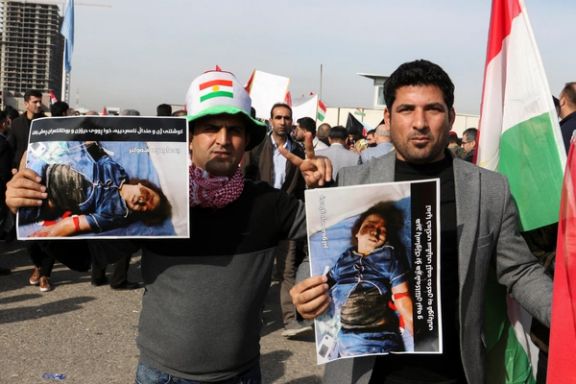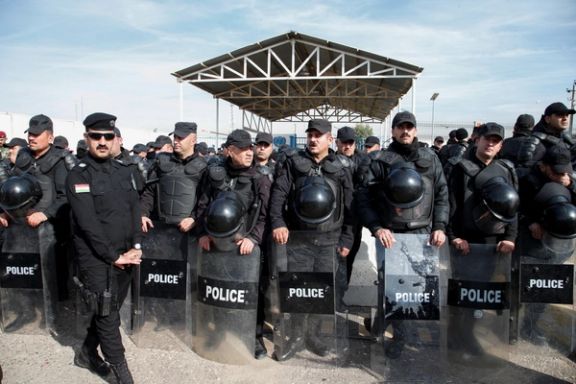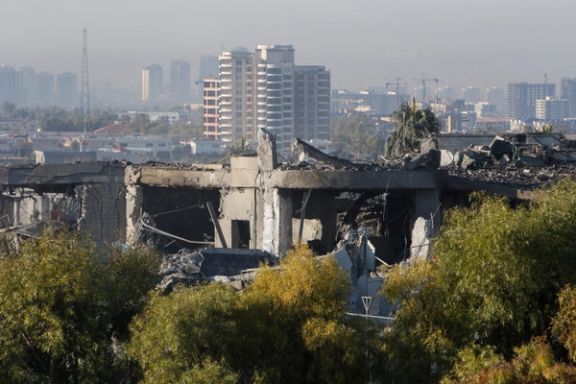Tensions Emerge Between Iraq And Iran After Missile Strike

Baghdad has exhibited an unusually strong reaction to the Iranian missile strike Monday night on targets in Erbil, northern Iraq, by recalling its ambassador.

Baghdad has exhibited an unusually strong reaction to the Iranian missile strike Monday night on targets in Erbil, northern Iraq, by recalling its ambassador.
Iraq has close ties with the Islamic Republic of Iran, both Shia-dominated governments, but the Iranian attack that destroyed the house of a well-know Iraqi Kurd, killing him and his family, solicited Baghdad’s angry response on Tuesday.
Tehran claimed that it targeted an Israeli “spy center” but Iraqi Kurdish leaders condemned the ballistic missile launch that killed a wealthy and influential member of their community.
Iran's Revolutionary Guards and regime officials in Tehran took a victory lap on Tuesday while also highlighting that they fired ballistic missiles at northern Syria, in their longest-range attack to date. They claimed they hit ISIS bases, where Afghan Islamic State forces were being trained. The Afghan ISIS had claimed responsibility for a January 13 twin suicide bombing in Iran that killed nearly 100 people.
It remains unclear why the IRGC did not target the specific group allegedly responsible for the terror attack in Afghanistan.
Iran’s missile strike in Iraq, however, is likely to deepen worries about worsening instability across the Middle East since the war between Israel and Hamas started on October 7, with Iran's militant proxy forces also entering the fray from Lebanon, Syria, Iraq and Yemen.

There has also been concern that Iraq could again become a theater for regional conflict after a series of US strikes on Iran-linked militant groups that are also part of Iraq's formal security forces. Those strikes came in response to dozens of attacks on US forces in the region carried out since mid-October.
The Guards said the late Monday attack, Iran's first direct military strike in the region linked to the Gaza war, was in response to Israeli 'atrocities" against several of its commanders and those of Iranian-allied forces around the Middle East since the conflict started.
Iraq National Security Adviser Qasim al-Araji condemned the strike as an infringement of sovereignty.
"We are very astonished by what happened because the Iraqi government was not informed," he said.
In protest to the strike, Iraq recalled its envoy from Tehran and summoned Iran's charge d'affaires in Baghdad, with the foreign ministry saying Baghdad would take all legal steps against what it called a violation of sovereignty.
The strike, on a residential area near the US consulate in Kurdistan's capital Erbil, was described by Iraqi Kurdish Prime Minister Masrour Barzani as a "crime against the Kurdish people" in which at least four civilians were killed and six injured.
Multimillionaire Kurdish businessman Peshraw Dizayee and several members of his family were among the dead, killed when at least one rocket crashed into their home, Iraqi security and medical sources said.
Araji denied the house was an Israeli spy center.
"To respond to the claim that there is a Mossad headquarters we visited the place and toured every corner of this house, and everything indicates that it is a family house belonging to an Iraqi businessman from Erbil," he told reporters.

'RECKLESS'
Israeli government spokesperson Avi Hayman said he would not speculate, when asked at a press briefing about Iran's assertion that it struck a Mossad site.
"What I will say is Iran continues to use its proxies to attack Israel on multiple fronts. We condemn Iran's activities, and we call on the international community to stand up in defiance of Iran and call for peace in the region as soon as possible," he said.
Defending the attack, Iranian Foreign Ministry spokesman Nasser Kanaani said Tehran respected the sovereignty and territorial integrity of other countries, but it was Iran's "legitimate right to deter national security threats".
The Guards said the attacks would continue "until avenging the last drops of martyrs' blood", referring to the killing of three members of the Guards in Syria last month who had served as military advisers there.
France and Britain accused Iran of violating Iraq's sovereignty and Washington condemned the attacks as "reckless", while American officials said no US facilities were struck and there were no US casualties.
With reporting by Reuters